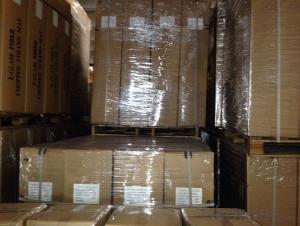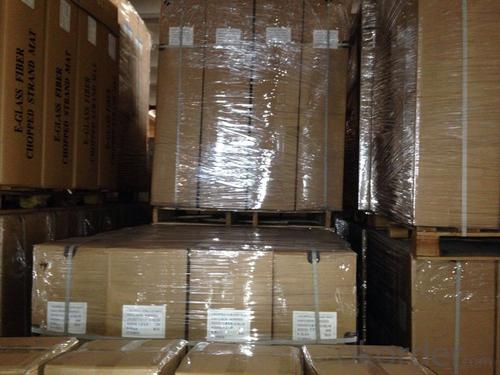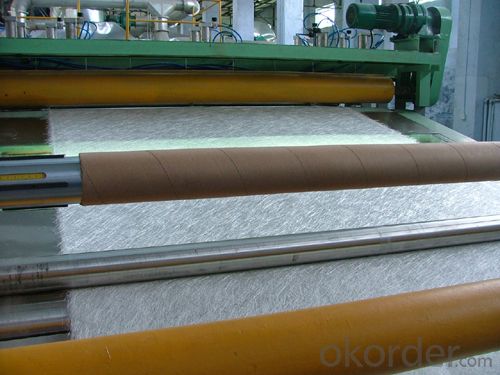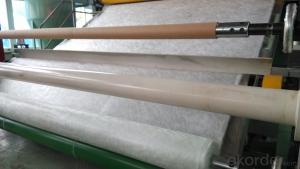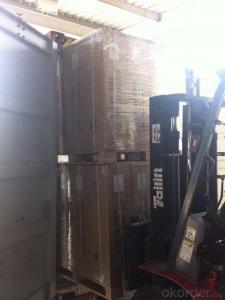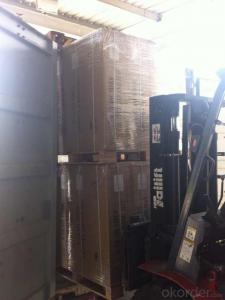Fiberglass Mat Tissue Emulsion Binder E Glass Chopped Strand Mat
- Loading Port:
- Shanghai
- Payment Terms:
- TT OR LC
- Min Order Qty:
- 1000 kg
- Supply Capability:
- 100000 kg/month
OKorder Service Pledge
OKorder Financial Service
You Might Also Like
Emulsion Binder E glass Chopped Strand Mat
Product description of Fiber Glass Powder Emulsion Chopped Strand Mat
Glass Fiber Emulsion Binder Chopped Strand Mat is an unwoven fabrics consisting of randomly distributed chopped strands held together with Emulsion Binder.
Emulsion Binder Chopped Strand Mats are compatible with unsaturated polyester, vinyl ester, phenol and epoxy resins.
Specification of Emulsion Binder E-Glass Chopped Strand Mat
Property | Glass type | Weight(g/m2) | Width 200~3300 | Roll Weight | Moisture Content /% | Combustible Content /% | Breakage Strength /N |
Test Method | GB/T 1549 | ISO3374:2000 | ISO3374 | GB/T17470-1998 | ISO3344:1997 | ISO1887:1995 | ISO3342 |
EMC 80 | E-GLASS | 80±16 | ±5 | 6~50 | <0.2< span=""> | 13.6±0.35 | ≥200 |
EMC 100 | E-GLASS | 100±10 | ±5 | 6~65 | <0.2< span=""> | 9.5±0.35 | ≥170 |
EMC 150 | E-GLASS | 150±15 | ±5 | 6~97 | <0.2< span=""> | 8.0±0.35 | ≥40 |
EMC 225 | E-GLASS | 225±22 | ±5 | 6~150 | <0.2< span=""> | 5.0±0.6 | ≥60 |
EMC 300 | E-GLASS | 300±30 | ±5 | 6~180 | <0.2< span=""> | 4.0±0.6 | ≥90 |
EMC 450 | E-GLASS | 450±45 | ±5 | 6~180 | <0.2< span=""> | 3.8±0.6 | ≥120 |
EMC 600 | E-GLASS | 600±60 | ±5 | 6~240 | <0.2< span=""> | 3.6±0.6 | ≥150 |
EMC 900 | E-GLASS | 900±90 | ±5 | 6~190 | <0.2< span=""> | 3.4±0.6 | ≥180 |
Characteristics of Emulsion Binder E Glass Chopped Strand Mat
1.Uniform density ensures consistent fiberglass content and mechanical properties of the composites products;
2.Uniform powder distribution ensures good mat integrity, little loose fibers and small roll diameter;
3, The composite products have high dry and wet tensile strength and good transparency.
4, Optional for high strength with stiff mat for panel laminating and midle strength with soft mat for hand layup.
Package:
1, the Mat roll will be wrapped in PVC/PE film, then packed with carton boxes;
2, Vertically placed on bottom pallets by:
4 rolls*4 rolls or 4 rolls* 5rolls
Horizontally placed on upper pallets by:
3 rolls*4 rolls
3, the whole pallet will be fasten by PVC strips;
4, the whole pallets will be wrapped by strentchable PE film.
FAQ:
1. What is your MOQ?
Our MOQ is one pallet.
2. Can you provide sample?
Yes, we can offer free sample for you.
3. Payment terms?
We can accept L/C, T/T etc.
4. Do you offer OEM service?
Yes, we can print customers’ logo on the packaging;
And the size and specification can be produced and design according to your demand.
5. What is the Production Lead Time?
1 *40HQ each day.
6. What kind of standard of the mat?
ISO9001-2008
GS Certificate (special for automotive industries)
DNV Certificate (Special for Marine)
LIyod
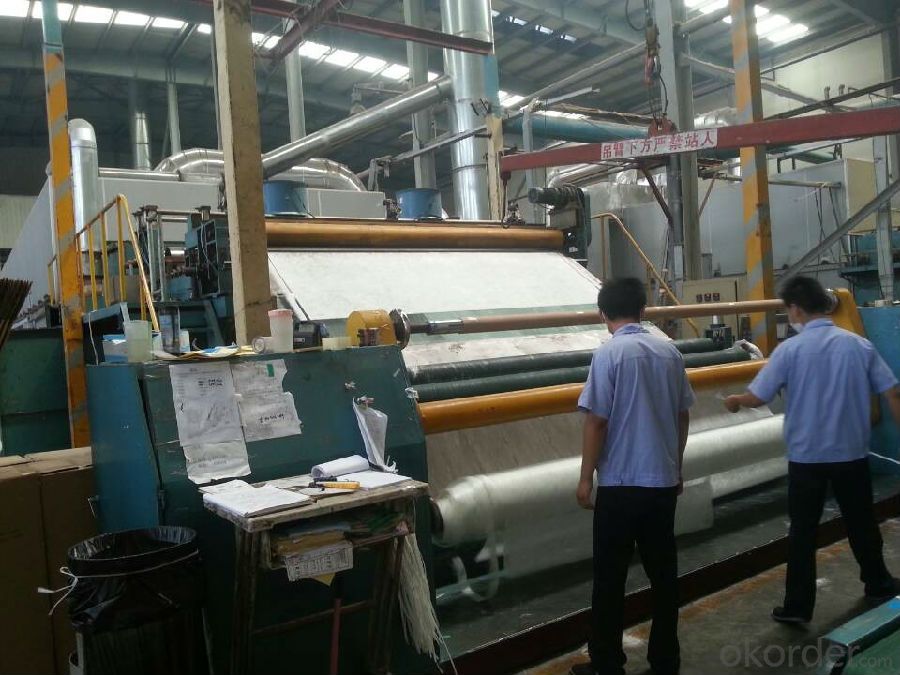
- Q: Is fiberglass mat tissue easy to install?
- Yes, fiberglass mat tissue is relatively easy to install. It is a lightweight and flexible material that can be easily cut and shaped to fit any surface. It can be applied using various methods such as spraying, rolling, or brushing on adhesive. The tissue is also self-adhesive, which makes it even easier to install as it can easily stick to the desired surface. Additionally, fiberglass mat tissues are typically designed to be water-resistant and provide excellent insulation properties, making them a popular choice for a wide range of applications. Overall, with proper preparation and following the manufacturer's instructions, installing fiberglass mat tissue can be a straightforward and hassle-free process.
- Q: What is the dimensional stability of fiberglass mat tissue?
- The ability of fiberglass mat tissue to maintain its size and shape under different conditions is referred to as its dimensional stability. Fiberglass mat tissue is well-known for its outstanding dimensional stability, which makes it highly resistant to shrinking, expanding, or warping. This stability is achieved through the manufacturing process, where glass fibers are bonded together using a binder material. Not only does this binder ensure the integrity of the mat tissue, but it also helps it maintain its dimensional stability over time. Moreover, the exceptional dimensional stability of fiberglass mat tissue is further enhanced by its inherent properties, such as its high strength and stiffness. These characteristics have made fiberglass mat tissue a popular choice in various industries, including construction, automotive, and aerospace, where maintaining consistent dimensions is essential for optimal performance and durability.
- Q: Does fiberglass mat tissue require any special precautions during storage?
- Special precautions are necessary when storing fiberglass mat tissue. Fiberglass is a delicate material that can easily be damaged if not stored correctly. Here are some precautions to keep in mind: 1. Maintain dry conditions: It is important to store fiberglass mat tissue in a dry, moisture-free environment. Excessive moisture can compromise its strength and integrity. 2. Avoid direct exposure to sunlight: The UV rays from sunlight can gradually degrade fiberglass. To prevent damage, store the material in a cool, shaded area away from direct sunlight. 3. Shield from dust and dirt: To maintain its effectiveness, fiberglass mat tissue should be stored in a clean, dust-free environment. Dust and dirt particles can become embedded in the material and reduce its efficiency. 4. Steer clear of extreme temperatures: Extreme heat or cold can also have an impact on the quality of fiberglass mat tissue. It is advisable to store it in an environment with controlled temperatures to prevent any potential damage. 5. Proper packaging: If the fiberglass mat tissue comes with packaging, it is recommended to keep it in its original packaging for added protection. If not, consider using a durable, moisture-resistant wrapping material. By adhering to these precautions, you can ensure that your fiberglass mat tissue remains in optimal condition during storage and is ready for use whenever necessary.
- Q: Can fiberglass mat tissue be used for boat building?
- Certainly, fiberglass mat tissue is a viable option for boat construction. It is a versatile and lightweight material that is frequently utilized in the building of boats. Its composition consists of thin fiberglass strands woven together to form a mat-like structure. This material is renowned for its exceptional strength-to-weight ratio, making it an optimal selection for boat builders. The utilization of fiberglass mat tissue in boat construction primarily serves to fortify the structure and provide added durability. It can be applied to various parts of the boat, including the hull and deck, to enhance its resilience and safeguard it against impacts. Moreover, it can be employed to create a smooth and uniform surface, which is crucial for achieving a professional-grade finish. One of the notable advantages of employing fiberglass mat tissue in boat construction lies in its ease of application. It can be effortlessly tailored to the desired size and molded to fit the desired shape, allowing for flexibility and customization. Additionally, it can be easily layered with other materials, such as epoxy resin, to create a robust and dependable composite. Furthermore, fiberglass mat tissue exhibits exceptional resistance to water and corrosion, rendering it suitable for marine environments. It is also recognized for its superb thermal and electrical insulation properties, both of which are highly advantageous for boat builders. In summary, fiberglass mat tissue is indeed a suitable choice for boat construction. Its lightweight nature, impressive strength, and resistance to water and corrosion establish it as a dependable and popular option among boat builders.
- Q: How is fiberglass mat tissue used in the production of sports equipment?
- Fiberglass mat tissue is widely used in the production of sports equipment due to its unique properties and advantages. This material is a non-woven fabric made from fine glass fibers bonded together with a binder. It has a smooth texture and is lightweight, yet strong and durable. In the production of sports equipment, fiberglass mat tissue is typically used as a reinforcing layer. It helps to enhance the strength and rigidity of the final product, making it more resistant to impact and stress. This is particularly important in sports equipment where durability and performance are crucial, such as in the manufacturing of surfboards, skateboards, snowboards, and tennis rackets. When constructing a surfboard, for example, fiberglass mat tissue is commonly layered over a foam core and then impregnated with epoxy resin. This combination creates a strong and lightweight structure that can withstand the forces exerted by the waves. Similarly, in snowboards and skateboards, fiberglass mat tissue is applied to the wooden core to provide additional strength and stiffness, allowing for better control and responsiveness. Moreover, fiberglass mat tissue is also used in the manufacturing of protective gear like helmets and shin guards. By incorporating this material into the production process, these items can be made more impact resistant and capable of absorbing shocks. This is vital in sports where there is a high risk of injury, as the fiberglass mat tissue acts as a protective layer, dispersing and reducing the force of impacts. Overall, fiberglass mat tissue plays a crucial role in the production of sports equipment by reinforcing structures, enhancing strength and durability, and improving performance. Its lightweight nature combined with its superior mechanical properties makes it an ideal choice for various sporting applications, ensuring athletes can rely on their equipment to perform at their best while minimizing the risk of injury.
- Q: What is the moisture vapor transmission rate of fiberglass mat tissue?
- The moisture vapor transmission rate of fiberglass mat tissue can vary depending on various factors such as the specific composition of the material and its thickness. However, in general, fiberglass mat tissue has a relatively low moisture vapor transmission rate. This means that it has a relatively low ability to allow moisture vapor to pass through it. This characteristic makes it a suitable material for applications where moisture resistance is desired, such as in insulation or construction materials. However, it is important to note that the moisture vapor transmission rate of fiberglass mat tissue can be further influenced by other factors such as the presence of coatings or laminations, which may enhance or restrict its moisture vapor transmission properties.
- Q: Does fiberglass mat tissue provide good fire protection?
- No, fiberglass mat tissue does not provide good fire protection.
- Q: Is fiberglass mat tissue resistant to mold and mildew?
- Yes, fiberglass mat tissue is resistant to mold and mildew due to its non-porous and moisture-resistant properties.
- Q: What are the potential health hazards associated with working with fiberglass mat tissue?
- There are several potential health hazards that can arise from working with fiberglass mat tissue due to its nature. One major concern is the inhalation of fiberglass particles, which can lead to respiratory problems. When fiberglass is cut or handled, it releases small particles into the air that are easily breathed in. Breathing in these particles for a prolonged period can cause irritation in the throat and lungs, as well as coughing and difficulty breathing. Another health hazard associated with fiberglass mat tissue is skin irritation. The tiny fibers from the material can cause redness, itching, and rashes when they come into contact with the skin. In some cases, prolonged exposure or repeated contact with fiberglass can result in more serious skin conditions like dermatitis. Furthermore, fiberglass mat tissue can also cause irritation and damage to the eyes. If the fibers come into contact with the eyes, they can cause redness, itching, watering, and even scratches on the cornea. It is important to wear appropriate eye protection, like goggles, to prevent any potential eye injuries when working with fiberglass. To minimize these potential health hazards, it is crucial to adhere to safety guidelines and use personal protective equipment (PPE) when working with fiberglass mat tissue. This includes wearing a respirator mask to prevent inhalation of particles, using gloves and protective clothing to reduce skin contact, and wearing safety goggles to protect the eyes. Regular cleaning and good hygiene practices are also essential to minimize any potential health risks associated with fiberglass. It is important to properly clean work areas to remove loose fibers, and to thoroughly wash hands and exposed skin after working with fiberglass. Overall, although working with fiberglass mat tissue can pose potential health hazards, taking appropriate safety precautions and following safety guidelines can greatly reduce the risk of any negative health effects.
- Q: What are the advantages of using fiberglass mat tissue in construction?
- Using fiberglass mat tissue in construction offers several advantages. Firstly, it provides excellent reinforcement and strength to construction materials, enhancing their durability and resistance to cracks, impacts, and weathering. This makes it an ideal choice for reinforcing concrete, roofing materials, and composite products. Secondly, fiberglass mat tissue is lightweight and easy to handle, making it convenient for construction purposes. Unlike heavy steel reinforcements, it can be easily cut, shaped, and applied without requiring specialized tools. This saves both labor and time, resulting in cost savings. Additionally, fiberglass mat tissue is non-corrosive and non-conductive, making it suitable for various environments. It remains unaffected by rust or degradation, even in harsh conditions, ensuring the longevity and reliability of the construction. Moreover, it does not conduct electricity, which is crucial for applications where electrical conductivity must be avoided. Furthermore, fiberglass mat tissue offers excellent thermal insulation properties. It acts as a barrier to heat transfer, creating a comfortable and energy-efficient interior environment. This can lead to reduced heating and cooling costs, making it a sustainable and cost-effective choice. Lastly, fiberglass mat tissue is resistant to fire and chemicals. It does not burn or release toxic fumes when exposed to flames, providing an added level of safety in construction. It also withstands many chemicals, including acids and alkalis, making it suitable for corrosive environments such as chemical plants or industrial facilities. In conclusion, the benefits of using fiberglass mat tissue in construction include enhanced reinforcement, lightweight and easy handling, non-corrosive and non-conductive properties, thermal insulation, fire resistance, and chemical resistance. These advantages make it a versatile and reliable material for various construction applications.
Send your message to us
Fiberglass Mat Tissue Emulsion Binder E Glass Chopped Strand Mat
- Loading Port:
- Shanghai
- Payment Terms:
- TT OR LC
- Min Order Qty:
- 1000 kg
- Supply Capability:
- 100000 kg/month
OKorder Service Pledge
OKorder Financial Service
Similar products
Hot products
Hot Searches
Related keywords
